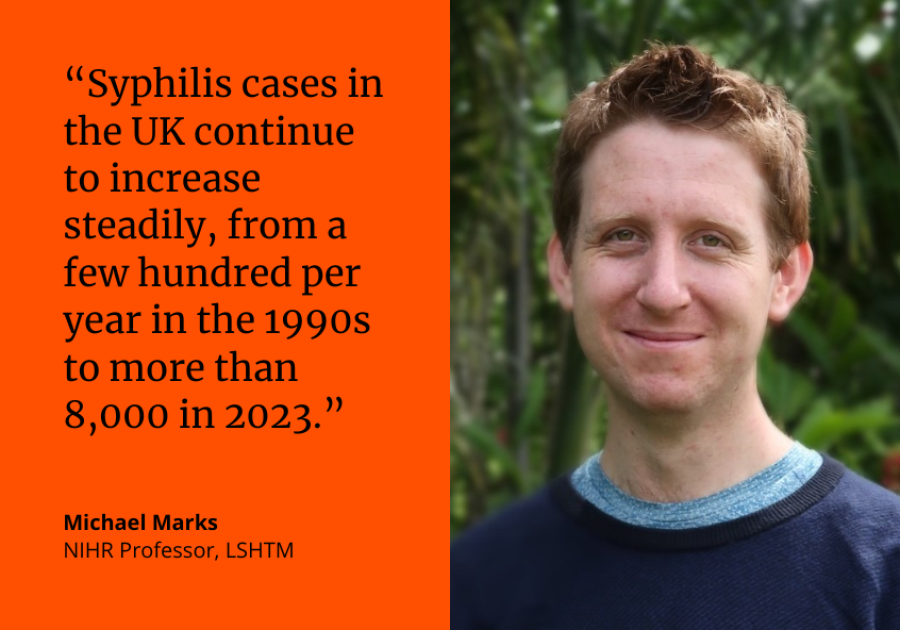Prestigious UK professorship awarded for sexual health research
22 January 2025 London School of Hygiene & Tropical Medicine London School of Hygiene & Tropical Medicine https://lshtm.ac.uk/themes/custom/lshtm/images/lshtm-logo-black.png
"Syphilis cases in the UK continue to increase steadily, from a few hundred per year in the 1990s to more than 8,000 in 2023." Michael Marks, NIHR Professor, LSHTM
Dr Michael Marks, Professor of Medicine at the London School of Hygiene & Tropical Medicine (LSHTM) and an Honorary Consultant in Infectious Diseases at the Hospital for Tropical Diseases, University College London Hospital, has received a prestigious Research Professorship from the National Institute of Health and Care Research (NIHR).
The NIHR Research Professorships scheme aims to strengthen and benefit health, public health and care research leadership across the UK. Research conducted by previous recipients has directly led to interventions which have improved patient care.
As part of his professorship, Dr Marks has been awarded around £2 million funding from NIHR to lead research into new tools to decrease syphilis cases in the UK.
Syphilis is a sexually transmitted infection (STI) caused by the bacterium Treponema pallidum. Mother-to-child transmission is one of the most important complications of syphilis which, if untreated, can affect up to 50% of pregnancies.
Professor Marks said: “Syphilis is an important sexually transmitted infection in the UK and worldwide. If untreated, syphilis can affect the brain and be passed on from pregnant women to their babies, causing prematurity, congenital syphilis and stillbirth.
“We need new ways to reduce syphilis cases, particularly as syphilis cases in the UK continue to increase steadily, from a few hundred per year in the 1990s to more than 8,000 in 2023.
“Through my NIHR Professorship, I will work with the UK Health Security Agency and sexual health providers to explore a range of new tools to help reduce the number of syphilis cases which we hope, in turn, can then be used to reduce other sexually transmitted infections in the UK and worldwide.
“A promising possibility may be using the genetic code of the bacteria. For many other infections, this information has helped us understand how infections spread from person to person and therefore, we can harness this to develop interventions that reduce its spread.
“We will also assess novel diagnostic strategies, such as self-testing in the privacy of your own home, which may allow us to identify patients with syphilis earlier to facilitate quicker treatment. We’ll also be working closely with community groups to ensure we reach all those at risk of infection and make sure any interventions proposed are aligned with their own needs.”
In 2020, the World Health Organization estimated 1 million pregnant women had syphilis and 200,000 stillbirths has been caused by the infection, placing syphilis as the second leading infectious cause of stillbirths after malaria.
Alongside his NIHR Professorship, Professor Marks and other colleagues has also been awarded more than £4 million in funding from the Gates Foundation, to support further syphilis research. The funding, awarded across 4 years, will contribute towards two global trials aiming to simplify treatment for pregnant women with syphilis and their infants globally.
Professor Marks said: “The standard treatment of syphilis in pregnant women relies almost exclusively on long-acting penicillins given over several doses.
“While this regimen is efficacious, it has important drawbacks which lead to incomplete treatment or treatment failure in real-world practice, particularly in countries where access to healthcare is not as readily available.
“Additionally, syphilis infections passed from mother-to-child do not always present in obvious symptoms at birth, meaning that treatment opportunities can be missed. It’s estimated that syphilis-exposed infants who do not display symptoms at birth account for 50-70% of all infants at risk of developing congenital syphilis, which significantly affects growth and development.
“In these trials, we will look to simplify the delivery of syphilis treatments, ideally reducing the number of doses and time needed, to help treat pregnant women and newborns as quickly and as effectively as possible.”
Read more about the projects on the NIHR and Gates Foundation websites.
If you enjoyed this article and would like to build a career in global health, we offer a range of MSc programmes covering health and data, infectious and tropical diseases, population health, and public health and policy.
Available on campus or online, including flexible study that works around your work and home life, be part of a global community at the UK's no.1 public health university.